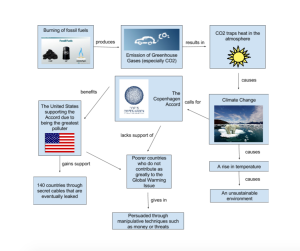In my systems diagram, I focused on the core cause of climate change and examined part of the environmental and political effects of it. Primarily, I focused on the Copenhagen Accord, which works to have countries pledge to undertake specific actions that will help mitigate the core cause of climate change – emission of greenhouse gases, primarily CO2. As a primary polluter, the United States sought out support for the Copenhagen Accord since their pledge was the lowest by any other leading nation. This would benefit the United States due to being a collective action effort to reduce emissions causing climate change. To gain support, the United States used techniques, including secret cables, use of CIA to discover secret information from other countries, and manipulation. Through this, they were able to gain support of 140 countries for the Copenhagen Accord. The poorer countries did not support the Accord due to being a small contribution in climate change. Pollution is a big factor that comes from emission of greenhouse gases, and as recalled in the IPAT equation, poorer countries cannot contribute as strongly to pollution due to not having enough funds for technology and having low affluence, thus having no need for the Copenhagen Accord since countries who barely contribute to global warming do not have the funds for programs that mitigate pollution. The small focus on climate change shows how a rise in temperature can cause an unsustainable environment. Climate change affects the earth due to temperature shifts, water level shifts, and cause extreme weather events, all that require adaptation for humans and the environment to adjust to, thus causing harm in the end to both parties.
The State Department cables should not have been made public because it showed the United States in a negative light. I believe that there are some policies that can be implemented without response from the media and by publicizing the cables, the United States is seen to other parties as untrustworthy and could affect the way people support future policies that the United States tries to implement. With that being said, the United States should have conducted climate change diplomacy in a different manner that had been done. Obviously, nothing can be reversed and the United States cannot change the way they gained support for the Copenhagen Accord, but in future times, the United States should negotiate in a way that is fair to all participating countries. The use of spying and manipulation makes the United States more of an enemy than an ally to many countries, and I think the United States should establish credibility and respect through showing other countries what can be offered through actions. This is an issue of ethics, especially distributive justice, where the United States should take responsibility for what the United States has done in regards to climate change and act in a way that aids poorer countries, rather than forcing them into something. Because the United States is such a great participant in the burning of fossil fuels, it should be their responsibility to reduce their fair share of what they are producing. The burning of fossil fuels is very important to our industry and lives, but the United States can take action to reduce their own emissions through implementing a carbon offset policy for huge factories.

